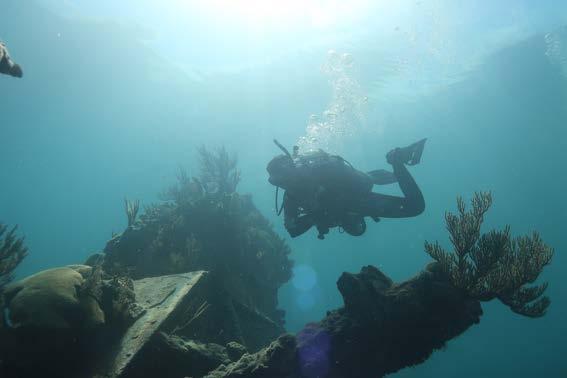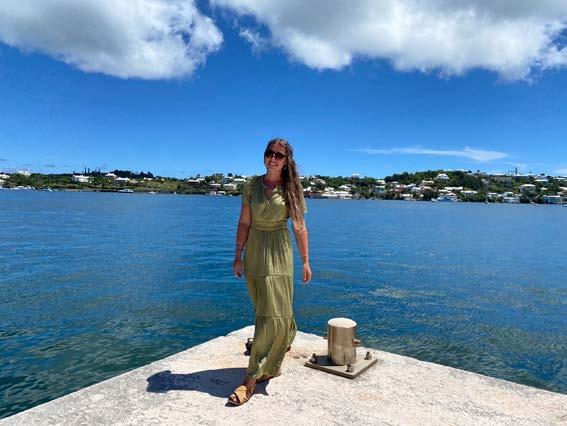
2 minute read
Attending the Coral Reef Ecology course at BIOS – by Thea Moule (MScRes
Marine Biology student)
Before entering academia, I worked across the world in the SCUBA diving industry, from Australia to Mexico.
During this time, I experienced first-hand anthropogenic and climate impacts on tropical coral reefs, igniting my passion for a research career focused on coral reef ecology. I later enrolled on a BSc in Marine Biology and an MScRes in Ocean Sciences at Bangor University, completing an undergraduate dissertation and postgraduate thesis centred around tropical coral reefs. Since my research was desk-based and my academic studies took place in a temperate region, I was eager to obtain relevant field and laboratory experience on tropical coral reef systems. Therefore, I was immensely grateful to my sponsor through the U.K. Associates of BIOS for the full scholarship, supporting my attendance on the Coral Reef Ecology Course (CRE) at the Bermuda Institute of Ocean Sciences (BIOS). Here, the Director of University Programs & Associate Scientist at BIOS, Dr Andrew Peters, was a former undergraduate student from Bangor University.
The CRE course, held from August 8th to 26th, was co-led by distinguished researchers at BIOS, Dr Eric Hochberg and Dr Yvonne Sawall, and taught around twenty international students, ranging from undergraduate to doctorate level. The evening before the course started, an icebreaker session held at the onsite bar, ‘The Wind’, provided a relaxed setting to meet faculty staff and the other students while enjoying a few drinks. Throughout the course, our schedule was filled with lectures, underwater visual census surveys, experiments in the field and lab, and delicious food freshly made by the onsite chefs. The practicals included a gas flux experiment in the flume, gradient flux equipment in the field, and various underwater survey techniques (e.g., imaging for photomosaics, quadrats, and point-intercept transects) to record benthos composition. During data collection, we were organised into groups and allocated specific tasks, including shifts on the flume, and alternating between the underwater survey techniques. Although all the practical elements were interesting, my favourite was photogrammetry. This approach involved repeatedly swimming up and down, both the length and width of a marked area, with an underwater camera, collecting hundreds of images of the benthos. The images were uploaded onto a system in the dry lab, creating a point cloud, a dense cloud, and photomosaic. It was a very satisfying process that produced beautiful images of the coral reef. During the last week, we collaborated in groups to conduct data analysis based on a research topic of interest from the data collected. We presented our research findings to the class on the final day of the course. For example, in the group I was a part of, our presentation was titled ‘Benthic community assemblages of functional reef groups’. Overall, the course was an incredible opportunity to advance my knowledge in reef-functional ecology, obtain fundamental skills in data collection of reef community processes, and network to establish industry connections for future opportunities.
Outside the CRE course, I took the opportunity to explore Bermuda, which was readily accessible by bus. Activities included recreational SCUBA trips with the local dive shops, snorkelling at the pristine white beaches, swimming in caves, and enjoying the architecture in Hamilton. I also attended the infamous Harbour Nights held in Hamilton, a fabulous evening full of music, local dance performances, and an array of market stalls and food trucks. During evening visits to Whalebone Bay, a short walk from BIOS, I was fortunate to encounter two eagle rays swimming near the shoreline and witnessed the phenomenon of the marine glow worms, who make an appearance two nights a year. These were all incredible experiences alongside the course.
Each year, BIOS offers a variety of ocean science courses aimed at undergraduate and postgraduate students, including Ecology of Reef Fish, Marine Pollution and Ecotoxicology, Modern Observational Oceanography, and Research Diving Methods, to name a few. Typically, the summer courses are advertised on the BIOS website at the beginning of the year. During the application process, students from the U.K. are eligible to apply for a scholarship through the U.K. Associates of BIOS to support their attendance. Overall, I highly recommend SOS students consider applying for such an incredible opportunity to advance professionally.











